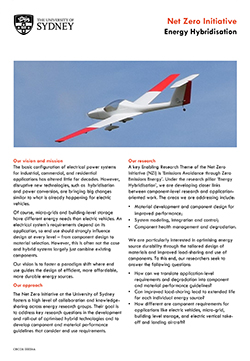The challenge
The transition to net zero energy requires big advancements in energy storage in order to ensure a reliable, low-cost energy supply. Not only will we need technologies that improve battery performance and lifespan, energy storage devices and components must also work well together within larger energy storage systems. Current research in this space focusses either on performance of individual devices and components or on their specific applications within larger energy storage systems. Little to no feedback exists between these research activities which are often conducted in disparate research groups. We address this gap at the NZI by uniting the entire research chain from fundamental research on energy storage materials and device components to their integration in final applications.
Why this research is valuable
The transition to net zero energy will involve a massive investment in new infrastructure – estimated by the International Energy Agency to be the order of US$2.4 trillion per year for the next 15 years. A significant portion of this investment will be directed toward new energy storage technologies and systems. The high level of collaboration and knowledge-sharing across energy storage research groups at the NZI will maximise investment by streamlining our R&D in this space, enabling advances in energy storage to reach the market sooner.
Research themes
- Material development and component design: develop new material which can improve the performance of batteries / supercapacitors and fuel cells
- System integration and control: optimal integration of various energy storage components into a hybrid system and their power / load sharing
- Health management and degradation: estimation and prediction of remaining useful life using machine learning algorithms


